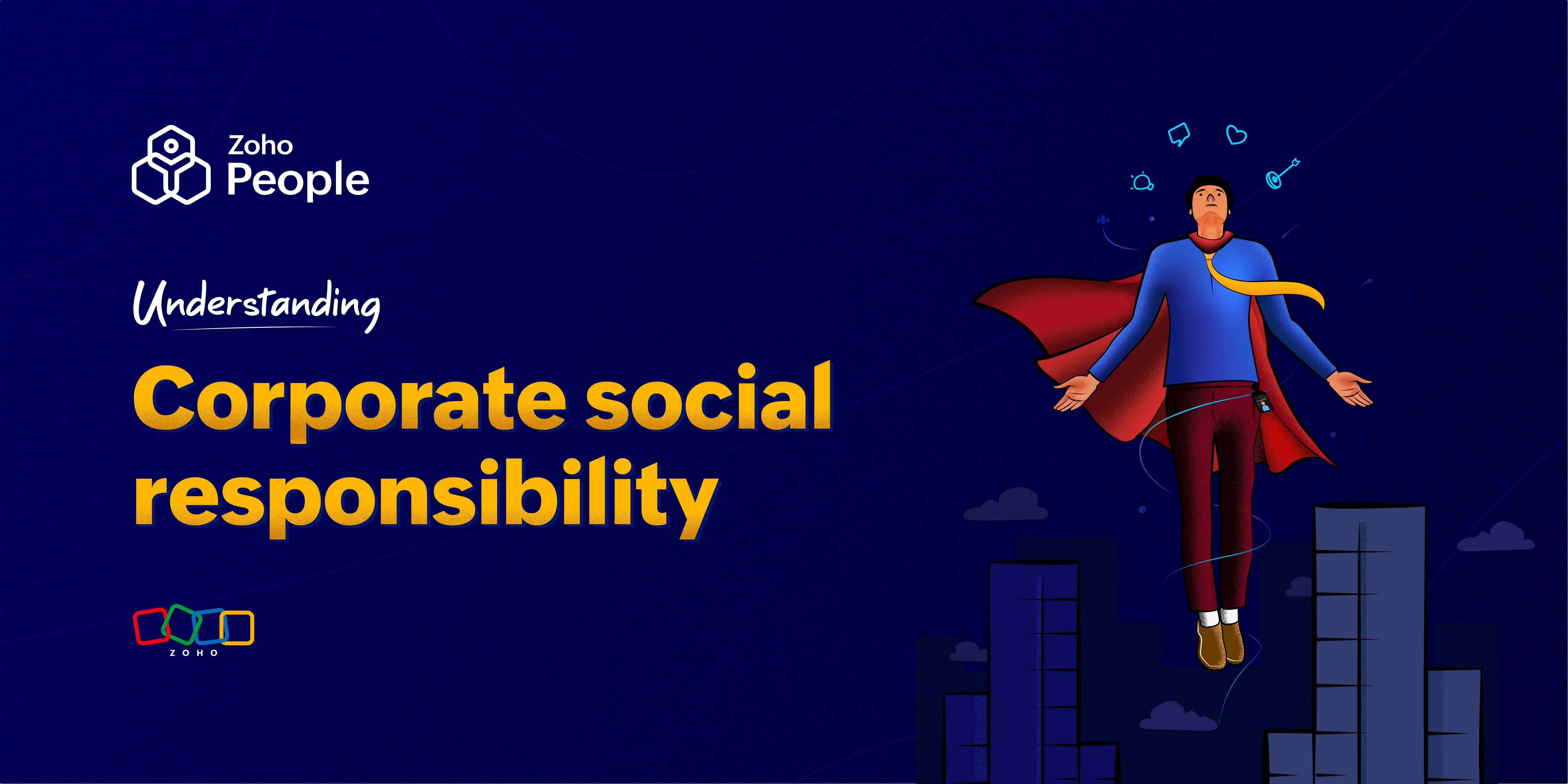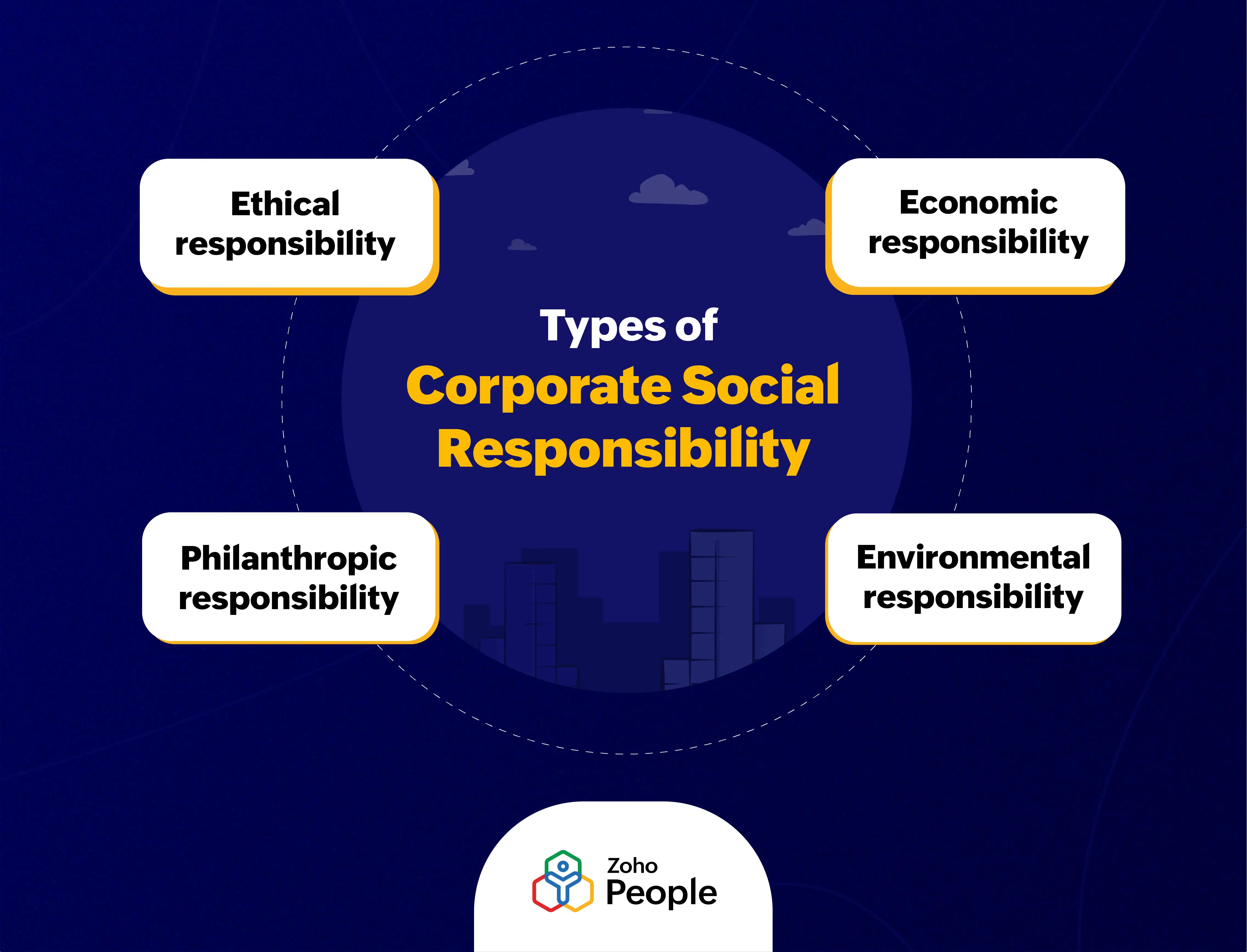Corporate social responsibility: Benefits, types, principles, and activities
- Last Updated : June 28, 2024
- 5.7K Views
- 6 Min Read

The corporate world is filled with countless events, initiatives, and strategies to shape the way businesses operate and interact with stakeholders. One of these concepts, corporate social responsibility, involves businesses doing more than just producing profits. It encourages them to act ethically and sustainably with the end goal of positively contributing to society.
What is corporate social responsibility?
Corporate social responsibility (CSR) is a business management model that focuses on an organization's environmental, economic, or social impact. By engaging in CSR activities, an organization can differentiate itself from competitors, improve its public image, and benefit its stakeholders, all while staying socially and environmentally accountable.
Benefits of corporate social responsibility
CSR goes beyond the traditional focus on boosting an organization's profile. Instead, it emphasizes the role of businesses in contributing to the well-being of society and the environment. The benefits of CSR activities include:
Brand recognition and reputation
CSR initiatives can significantly increase the brand's visibility and recognition. When an organization gets involved in socially responsible activities, it will likely attract media attention. This increase in social visibility helps the organization further establish its brand. An impactful CSR approach can distinguish an organization from its competitors, making it more appealing to consumers. It can also guarantee new opportunities for partnerships, collaboration, and sponsorships in order to boost the company's place in the market.
Increased customer loyalty
CSR initiatives can cultivate a strong bond between a company and its consumers. When a consumer of the company is committed to socially and environmentally responsible activities, they are most likely to favor and support that brand, knowing that their contributions help society. This causes consumers to repeat their business. This is how long-lasting customer relationships are built.
Better financial performance
Organizations that invest in CSR often witness a positive elevation in their financial performance. Such responsible practices could lower costs with improved efficiency and waste reduction. They can also attract better talent and facilitate access to newer markets. Moreover, a socially responsible company enjoys better relationships with its stakeholders, leading to more stable revenue streams.
Legal compliance
Participation in CSR activities helps companies adhere to existing laws and regulations. It also helps them adapt to future changes in the rules and regulations. By following the legal standards, organizations can avoid costly fines and maintain their ability to operate the organization without any disruption.
Four types of corporate social responsibility
CSR comprises a wide range of activities and practices, each aimed at addressing specific societal and environmental issues. By understanding and implementing these various types, organizations can effectively contribute to sustainable development and improve their overall impact on society.
There are four types of CSR, which include environmental responsibility, ethical responsibility, philanthropic responsibility, and economic responsibility.

1. Environmental responsibility
Environmental responsibility refers to an organization's actions and practices aimed at promoting environmental sustainability and minimizing its impact on society. It might include key practices such as carbon footprint reduction, enhancement of energy efficiency, waste management, and use of proper resources. Organizations that are concerned about environmental responsibility are very cautious while implementing environment-friendly processes. They are oriented towards the complete assurance that, come what may, the business interests of the company are not harmful to the environment and strive towards a completely sustainable planet.
2. Ethical responsibility
Economic responsibility means conducting business that is just, transparent, and of high moral standards. This includes treating all employees in a fair way by offering them safe working conditions, competitive wages, and subscribing to the workers' rights. Organizations must always carry out responsible marketing policies that truthfully describe products and services without deceiving consumers.
3. Philanthropic responsibility
Philanthropic responsibility refers to business activities conducted by a corporation in order to uplift and sustain the community through charitable contributions and public service. These forms of social responsibility include donations to schools, local groups, disaster relief, and an endless list of other community building programs. Corporations that engage in philanthropic activities are concerned with positively impacting society beyond their business as usual. Such acts contribute to the solution of critical issues and encompass the development and sustainability of communities.
4. Economical responsibility
Economic responsibility refers to making financial decisions related to a commitment to sustainable economic practices. This involves practicing fair trade, investing in the local community, and securing economic opportunities for all stakeholders. Businesses with a dimension of economic responsibility place long-term economic stability above short-term gains.
What kind of activities can be done for corporate social responsibility?
Charity
Charity is one of the most common ways to conduct CSR activities. It includes supporting charitable organization and non-profitable organizations through financial aid or in-kind contributions. This can support the solution of critical social problems like poverty, education, and healthcare.
Reducing carbon footprints
Carbon footprints refers to the amount of harmful gasses, such as carbon dioxide, methane, and nitrous oxide, that are released into the atmosphere. This may cause air pollution, water pollution, and leads to health complications. In order to reduce these effects, organizations invest in renewable resources and promote energy conservation amongst their employees and customers. For instance, organizations can switch to energy-efficient lighting instead of using incandescent bulbs, and they can encourage employees to use bicycles for traveling short distances.
Community service
Engaging in community services helps in building a relationship between an organization and the local community. This could be done through clothing or food drives, tree planting, construction of public facilities, and sponsorship of local events. By supporting community services that help improve people's lifestyles, a company can become more socially engaged.
Natural disaster relief
Providing aid for natural disasters is one of the most important activities in CSR. Organizations can contribute by donating supplies, offering financial assistance, and mobilizing resources to support the affected communities. For instance, organizations can set up emergency funds, supply goods, and provide a temporary place to stay.
Seven principles of corporate social responsibility
The 7 key principles of CSR provide a comprehensive framework that organizations can use to integrate responsible practices into their operations and decision-making. These principles direct precisely how companies should address the general, sometimes complex landscape of social, environmental, and ethical considerations.
It is through an understanding and implementation of these principles that businesses can become truly responsive corporate citizens, cultivate trust and credibility with their stakeholders, and help affirm improvements in the communities and environment in which they conduct operations.
1. Accountability
The company must take responsibility for its impact on society and the environment. This involves acknowledging the mistakes and making necessary improvements.
2. Transparency
Being open and honest about the organization's practices involves regularly reporting CSR activities, goals, and outcomes. This keeps stakeholders informed.
3. Ethical behavior
Companies must operate with integrity. This involves adhering to ethical standards in all the aspects of business, from employee relationships to customer interactions.
4. Respect for stakeholders' interests
Organizations must consider the interests of all the stakeholders, which includes the employees, investors, customers, and community. Engaging with stakeholders and addressing their concerns is crucial.
5. Respect for the rule of law
It's vital to comply with all the legal rules and regulations. Companies must operate within the legal framework of the countries in which they do business.
6. Respect for international norms
Organizations must accept international practices and standards, even when working in regions where compliance with such regulations is not as strict by local standards. Best practices should be adopted in the processes of tending to labor rights, protection of the environment, and action against corruption.
7. Respect for human rights
Companies must guarantee that their business activities do not violate the rights of individuals and communities.
Challenges and solutions in CSR
When conducting an effective CSR program, organizations may face some obstacles, which can hinder the effectiveness of the CSR activities. Here are some key challenges faced by organizations during CSR activity:
Limited resources
Challenge:
Due to the limited availability of resources, medium and small-sized businesses are often reluctant to participate in CSR activities.
Solution:
Collaborate with other organizations, NGOs, or even government entities that can offer the necessary material or intellectual resources.
Measuring impact
Challenge:
It's tiring to measure the impact of CSR efforts because of the intangible and long-term nature of social and environmental benefits.
Solution:
Leverage social media to measure online activity and conversation about the organization's CSR activities. Calculate the total number of shares, likes, comments, and mentions related to these CSR activities to understand the level of audience engagement and awareness.
Wrapping up
Corporate social responsibility is not just about doing good but doing well by doing good. This is no longer about options or choice; it is about contemporary business. CSR is irrevocably linked with brand recognition and reputation, customer loyalty, enhanced financial performance, and ultimately business survival and growth. By understanding of the different types of CSR, adhering to its main principles, and successfully rising above its challenges, companies will be in a good position to make positive impacts on society and the environment.
